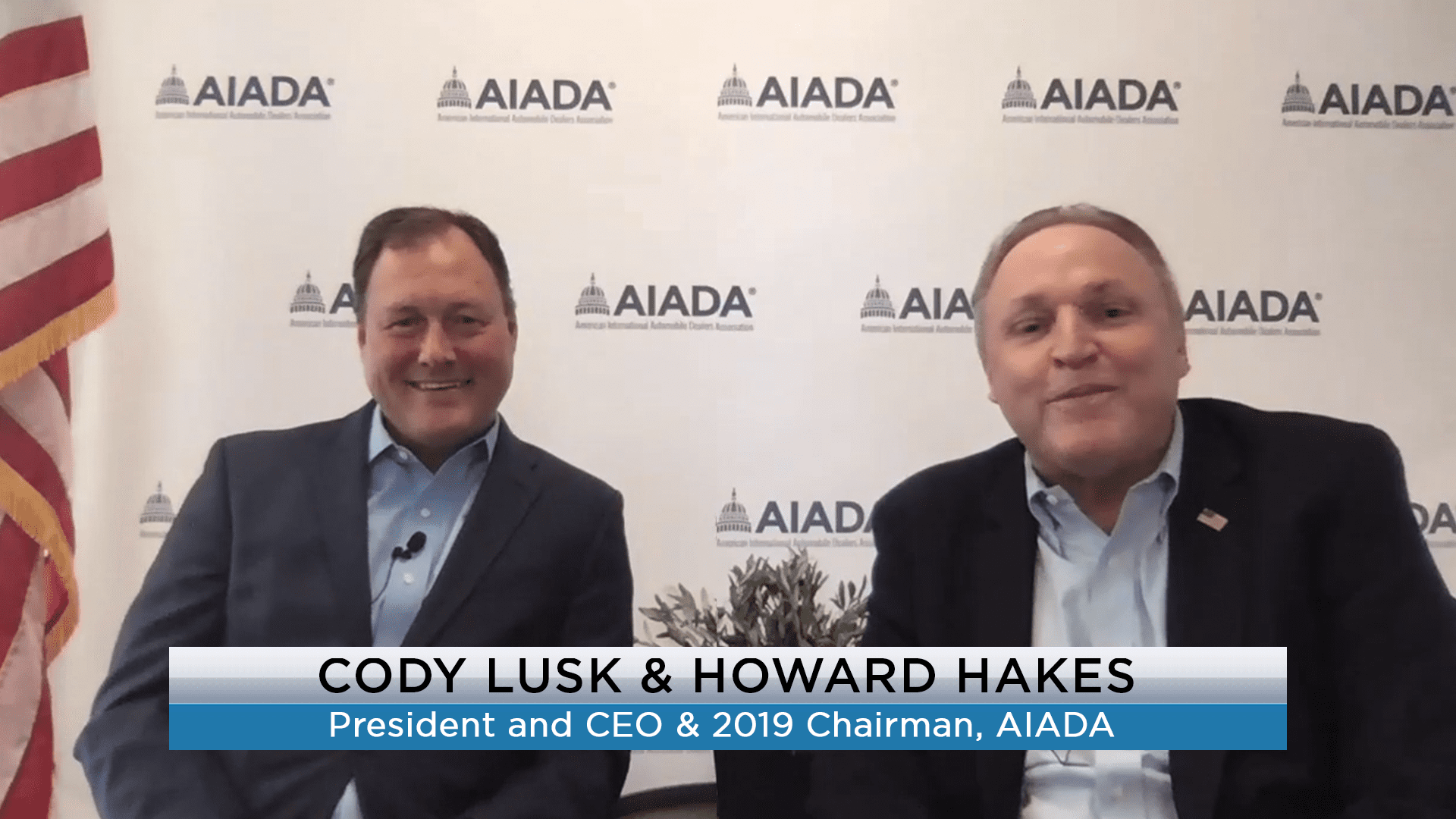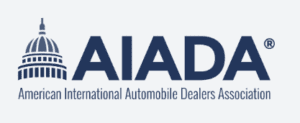On today’s special edition of CBT News, we’re happy to have Cody Lusk, President and CEO of the AIADA and the newly installed 2019 chairman, Howard Hakes. Cody and Howard discuss challenges facing the auto retail industry, including tariffs, consumer confidence, and trade.
Jim Fitzpatrick: Thank you, gentlemen, for joining us on CBT News today.
Howard Hakes: Thank you, Jim.
Cody Lusk: Yeah, thank you for having us, Jim.
Jim Fitzpatrick: Great. I know up there near Capitol Hill, you’re two very busy individuals these days with all that’s going on. So we’re going to talk about that today. For some of the dealers that are watching us today, Mr. Hakes, if you can kind of give us a little bit of your journey in the auto industry thus far before taking the helm of the association, kind of give us what you’ve been up to and your experience thus far.
Howard Hakes: I’ve been in the industry for 28 years, worked for a company, Hitchcock Automotive, which I’m president of, and have gone through all the different various parts of the business and now president of Hitchcock Automotive and we have about 500 employees in southern California.
Jim Fitzpatrick: Wow. So you know what these dealers are going through, don’t you?
Howard Hakes: Absolutely.
Jim Fitzpatrick: Sure. Talk to us a little bit about some of the wins Cody, before we get started on 2019. What were some of the wins for 2018 for the association?
Cody Lusk: I think we saw … We helped beat back or at least temporarily halt the tariffs from being imposed right off the bat so to speak. We’ve also worked to educate members of Congress on the negative impact these tariffs would have. I think we’re making some headway. We’re seeing legislation being drafted. It takes a while to get everybody up to speed and understand the impact, but I can honestly tell you the industry has never been as united as it is right now as we’re staring … We’re a stressed industry right now, things aren’t going great to kick off 2019 and so the last thing we can afford as an industry is to have punitive new 25% tariffs put on top of that. So I think we’re seeing an industry united like we’ve never seen before and hopefully we can stay that way.
Jim Fitzpatrick: Absolutely. Now that we’re into 2019, let’s talk about some of the things on the to-do list for the AIADA.
Cody Lusk: Well, I’ll just let Howard speak for some of his goals as chairman but first of all, we’re all about right now, it’s tariffs, tariffs, tariffs and we’ve got our sort of emergency tariff fly-in coming in April 9th and 10th, bringing dealers and industry leaders from across the country here to talk about this issue. The clock is ticking. We fully expect the administration to use almost all of it’s allotted time. They keep telling us so. This could last up to 270 days before we really know anything, so it’s just like a dark cloud hovering over the industry and that’s what we’re squarely focused on right now.
Jim Fitzpatrick: Sure. Mr. Hakes, you’re obviously an auto dealer, and you’re out there just like many of our viewers are, running the dealerships. Is the tariff issue a real concrete threat to our industry or is it just one of the those things that might add a few hundred bucks to a sticker price, and we’ll be laughing about it a few years from now?
Howard Hakes: It absolutely is, it is concerning. It’s one of the things that when you think about it, you look at if something goes into effect like that as you’re trying to sell cars. It comes into employees. Do I have to layoff employees? Do I have to not take as many cars? The downturn in the business that this would do. I’ve always gone by as the automobile business goes, goes the economy. That’s being such a huge part of it. So it is a real crucial time for all of us to really get together and make sure that we’re on the same page.
Howard Hakes: Cody and I were just with about 10 manufacture people from the manufacturers talking about this. So that hasn’t happened in a while. We have the manufacturers, you have the dealers, you have the associations all on one page fighting one battle. So I feel good that we’re all together but this is a crucial time, and the threat is real.
Jim Fitzpatrick: Sure. As you know, Trump enjoys a lot of support among new car dealers and franchisees out there and we’ve spoken to a few of them here at CBT News and actually, there’s some large auto group presidents out there that say, “Let Trump do what he’s gotta do because it’s about time that we level the playing field in this area and that we gotta let the President play this one out regardless of where the chips fall.” What do you say to those dealers that look at it that way?
Howard Hakes: Well I mean, letting the President do what he needs to do, I mean, that’s how he got where he is so, I guess we do have to do that. But we gotta be ready. My key thing is we gotta be ready from the dealer’s standpoint, from the association’s standpoint, from the manufacturer’s standpoint, to have everybody talking to the administration, talking to congressman, talking to senators and letting them know what the impact of the tariffs would be.
So we’re gonna fight back just as you say, “Let him do what he wants to do.” We gotta do what we gotta do, to make sure the administration understands what this would do to the automobile business, but the economy in general.
Jim Fitzpatrick: Absolutely, you talked about global trade being one of the greatest threats to the auto industry overall when you took the helm just a couple of months ago. Do you still see that as such today?
Howard Hakes: Well no question, I mean, you look at NAFTA and the new USMCA. You look at how we have built this industry on global trade and how it’s giving back within the country. It’s not perfect, but it’s what we have, and I think with the new USMCA, it’s a better look for America on that, so we gotta get that through and with the tariffs. It would just be a disaster and that’s not something that we have built this industry on to just have an automatic tariff come into effect.
Cody Lusk: And that’s one of the pitches we’ve made to the administration. Quite frankly is that you’ve built a good economy, you’ve built a solid economy. It’s starting to slow down a little bit. But if you add tariffs on the auto sector that nobody wants, we’re all in this against these tariffs, what that would just destroy. I think Bob Carter at our luncheon mentioned that would be catastrophic to not just the auto sector, but the economy. So that’s one of the issues we’re, as an industry united, are making to the administration to say, “Hey we want to keep a good economy going. Don’t impose the tariffs and make sure that this stops.”
Howard Hakes: And it’s not just the cars, as Cody talks about there. I mean, the trickle-down effect of the vendors that deal with the tire vendors, some part vendors, different vendors that I use within the industry. The trickle-down effect that comes down to a slow down in car sales is huge.
Jim Fitzpatrick: You talked in your acceptance speech about the importance of your members getting involved, especially on this trade, this very important trade issue and tariff issue. Talk to us about that, ’cause I know that’s a passion of yours in terms of the members not just looking at this as a spectator sport, but actually rolling their shirt sleeves up and getting involved.
Howard Hakes: Absolutely. I mean, I’ve always lived by 80/20 rule in my life. It truly is true here and with our industry that 20% of the people roll up their sleeves and do it, and the other 80 sit on the sideline, not that … They might pay some things they might do, but they’re not there and this is a crucial moment in our industry that we need everybody on the same page. April 9th and 10th, we’re here in DC for our AIADA fly-in, and we’re asking every dealer to get involved, to get here, so we can get them with their congressman or senator and let them speak to them directly, instead of just a letter campaign that we’re all so good at.
We wanna get as many here to make sure that we’re doing the right thing, and we’re sending the message all through Capitol Hill and the administration that tariffs are taxes. They’re not good for this industry.
Jim Fitzpatrick: And you know, there’s not a congressman or senator out there that hasn’t tapped on the shoulder of their local dealers for some contributions to even get elected. I mean the dealer body has a much bigger muscle than they utilize on something like this, right?
Howard Hakes: We have such a brick and mortar investment in our communities. I mean, you look at the deal, what we do within the communities. The baseball fields, the hospitals, things that we support and we love to because these are the people that are buying cars from us or buy around us. So we absolutely are very invested and so with our elected officials, we make sure that we know them and if there’s an issue, local, state and federally, we’re talking to them to say, “Hey, this isn’t right for our business, ’cause if our business is slowing down, the whole economy is slowing down.”
Jim Fitzpatrick: Auto dealers have been challenged with margin compression as you know, you’re a dealer so that’s something that you live every day, right? Obviously, the stair step program has been something of great controversy here over the last number of years. What’s your take on that and what can dealers do to combat the ever decreasing margins on new vehicles?
Howard Hakes: It’s a tough thing. Margins on vehicles have to have slipped. It’s a consumer market right now. The consumer’s in control with the buying power, which is okay with us. We’ll continue to sell cars to ’em, but we can just sell cars one at a time the right way. I mean, there’s nothing I can about the margin slipping in some ways. That’s just the economy that’s out there and that’s what’s happening right now. I guess I can sell more used cars and that helps out, but you just have to fight through it and make sure you have the right processes in place to sell cars.
Jim Fitzpatrick: Sure. NADA says that we’re gonna need some 76000 technicians in our industry over the course of the next 4 years. What’s your take on that? That’s an astounding number and what can the industry do or the association do to help dealers with getting more technicians into their dealerships?
Howard Hakes: You know it is a crisis. I mean, you look at that job, and it’s a great job, and they can make some great money as a certified Toyota or Honda or Mercedes technician. But we need to get more people in the trade schools and things. The California Motor Car Dealer’s Association is what I’m involved with. They support the trade schools out there and us dealers try to hire the people out of these to get there, but it is absolutely impossible to find great people in that position. A certified technician is gold in our industry when they come in and apply for a job.
Jim Fitzpatrick: Yeah, boy that’s for sure. Jumping to the variable ops side of the dealership. We still suffer with a 60 or 70% turnover rate as you know in the industry, specifically among salespeople and such. What can the industry do to change that model? The number of dealers out there are playing with different kinds of compensation plans, whether it be a salary plus a unit bonus or trying to pay for maybe some college education or student loans off.
Jim Fitzpatrick: But we’re just trying to do a lot of different things but I think the industry needs to really kinda hone in on trying to stop the bleeding with regard to employee retention.
Howard Hakes: There’s no question. In California, a little more difficult for us. I mean, with the wage an hour laws that I have to deal with are much stricter than some other states. So yes, we have a hybrid pay plan, which is hourly plus some bonuses that they get paid. And it’s made it to bring some other people in that didn’t come before because it’s not a straight commission anymore.
So it has been a benefit in some ways, but to that straight commission salesman, they don’t like it as much because we’ve had to go the other way. So it’s a Catch 22, but we’re looking at different pay plans all the time to keep the right salesman around, and it’s a tough job. It’s a nights and weekend job, we’re open seven days a week ’til 10 at night so to keep the good salesman around, you do have to throw some fringe benefits out there.
Jim Fitzpatrick: Sure, sure. Well you just took the gavel of a very large association with incredible constituency there. What are some of the things that keep you up at night with regard to the future in the auto industry and specifically among import dealers?
Howard Hakes: Well I guess the future right now is to be this year in ’19, so I’m not gonna look past that. But I think it is trade. I mean it is the fear of waking up one morning with a tweet that might be out there or something that says, “Hey, a 25% tariff has been hit on them, and it starts now.” And we have to be ready for that and make sure that every dealer knows that that is a possibility that could happen, and we can prevent it. We have the resources to prevent it by making sure we talk to our constituents, and we talk to the administration and say, “This is what will happen if you do that.” And that’s what our goal is to do this year.
Jim Fitzpatrick: Cody, has the association had to deal with any issue as big as the tariff issue in the past and how did that come out?
Cody Lusk: Yeah, you know, I cut my teeth many years ago when President Clinton threatened 100% tariffs on Japanese luxury vehicles. That was really my first entree’ into the auto sector and covering sort of legislative issues. And I remember at that time that there were dealers that I knew who were very involved, guys like Fritz Hitchcock, guys like Fred Miller, these icons of the industry who led the effort. But I also remember there were dealers I had never heard of who had never attended one meeting, who had never responded to one thing who went out into the media, and they were the first ones to squawk about how devastating that would be.
And I said, “That’s what we’re gonna do with this.” We’re making sure every single dealer knows the consequences that something like this could have. I also remember I came in right after the luxury tax on automobiles had come through and there was a whole dynamic about some dealers thought this … Everybody had misplayed their hands and everybody was placing blame, and I said, “You know what, as long as I’m running this association, no one’s ever gonna be confused about where we stand. We’re either for something, or we’re against it. We’re never gonna be in the squishy middle.” And that’s what we’re doing now, and we’re leading from the front. This is a devastating issue. We’re leaving it all on the field. We hope that it all goes away. But that’s a hope and hope is not a strategy and with Howard at the helm, we’ve got a great strategy in place with all the OEMs and all the other interested parties to make this happen and get a successful result for the industry.
Howard Hakes: And I think one other thing on that Cody. It is a bipartisan issue. This is not an issue that’s Republican or Democrat that we’re just fighting against one side. Both sides do not want tariffs, most of our people. So you can go into any office and say, “Hey, this isn’t good for the economy.” And they somewhat agree with you. There might be a couple tweaks that we have to talk to with different legislators. But most of ’em are on par saying, “Yes, the automobile industry is huge and if you tax that, it’s gonna be bad for the economy.”
Jim Fitzpatrick: Do you find that some of your constituents and some of your members are conflicted in this issue because they do support the President in a number of other areas, and a number of other moves that he’s made, that it’s kind of which way, are you either with me or against me, even though there may be some bad against me?
Howard Hakes: I’d be one of those. There’s no question that, that absolutely. I mean, but again, I’ll go back to 80/20, I like 80% of it and I’m okay with it. But I mean, the economy has grown in the last couple years, and it’s been okay but besides that, we’re just concerned with this part of it, that he can’t just enact a 25% tariff and think that nothing’s going to happen, and the ramifications politically for him would probably not be good either.
Jim Fitzpatrick: Yeah, that’s a very good point, very good point. Well, Cody Lusk, President of the AIADA and the newly installed and very ambitious and very passionate new chairman for 2019, Mr. Howard Hakes, thank you very much for joining us on CBT News, we appreciate it. Hopefully, we can have you back on in a few months to see how some of these things rolled out.
Thank you for watching the official news source of the retail automotive industry. This has been a JBF Business Media production.









